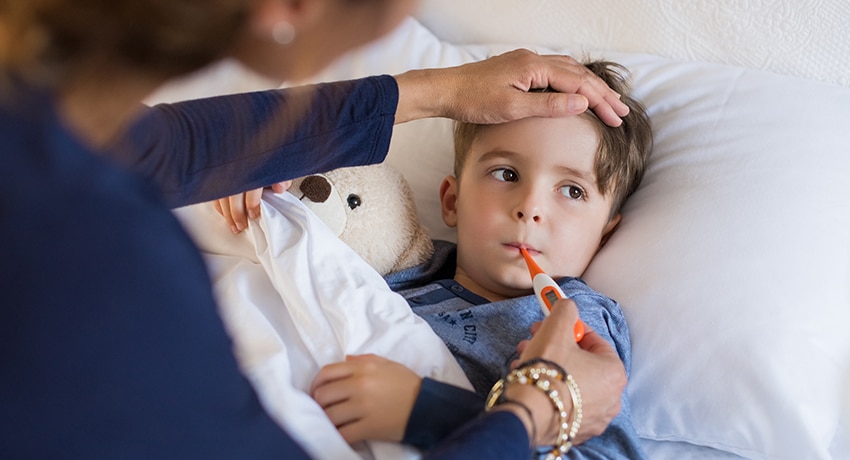
Winter is a peak time for children to get sick. As they spend more time indoors with other people, they’re more likely to catch and spread contagious illnesses. The common cold, croup, flu, RSV, and strep throat are just some of these offenders.
Fortunately, Katie K. Tran, MD, pediatrician with UT Physicians and assistant professor of pediatrics at McGovern Medical School at UTHealth Houston, offers you six key tips should your young one start to feel under the weather.
Know when it’s a fever
An official fever is a temperature at or above 38 C or 100.4 F. If your feverish child isn’t feeling too bad, it’s all right to wait and see if the high temperature drops or goes away on its own before giving any medication.
“Fever is the body’s natural response to fighting infection. But if your child is feeling poorly or acting fussy, or not feeling well enough to drink fluids, treat them with a fever-reducing medicine,” Tran said. “If your child has a fever while sleeping, it’s usually better to let them rest and give them medicine only after they wake up on their own.”
Be careful with fever-reducing medications
The most common fever-reducing medications are acetaminophen or ibuprofen. Acetaminophen is generally safe for most children, but ibuprofen is only recommended for those 6 months and older. Aspirin is generally not recommended as a fever reducer for children.
“If you believe your child needs a medicine for fever or pain, be sure to read the label first. Know the active ingredient and which one is safe to give to them,” Tran said. “If you’re unsure which to give, contact your pediatrician or family doctor.”
Give lots of fluids
Fluids are necessary to replace water lost through fever, vomiting, and/or diarrhea. Make sure your sick child frequently sips water or pediatric electrolyte drinks throughout the day.
“It’s OK if your child’s appetite drops off. It’s more necessary to keep them hydrated,” Tran said. “When the body has the fluids it needs, it helps fight viruses and infections. Helping your child stay hydrated is important.”
Be proactive with infants and toddlers
Toddlers and infants run a higher risk of respiratory infections because their immune systems aren’t fully developed. Wash your tot’s hands often as well as their bottles/cups and toys.
“Pediatricians do worry more about children 2 and under because they’re more likely to be hospitalized for flu, RSV, and other respiratory viruses than older children. If you already know of an exposure from day care or a social event, and you notice an onset of symptoms, contact your doctor.”
Act when it’s alarming
Signs your child may need medical attention include: fever that doesn’t go away within three days, dehydration with a decrease in urinary output, fussiness that can’t be calmed, and breathing problems.
“Every situation is unique. One child may have trouble right away while another may get progressively worse,” Tran said. “What’s important is that you immediately contact your pediatrician if you see anything alarming. Take them to a pediatric urgent care or a pediatric emergency department if necessary.”
Become familiar with the symptoms
Learn the symptoms and treatments of some common ailments.
Common cold
Medical name: Viral rhinitis, Cause: Virus
Possible symptoms: Cough,headache, nasal congestion, runny nose, watery eyes
Common treatment: Fluids and rest; possible over-the-counter fever/pain reducers suggested by pediatrician
Croup
Medical name: Laryngotracheobronchitis, Cause: Virus
Possible symptoms: Bark-like cough, severe coughing that worsens at night
Common treatment: Fluids and rest; steam; possible prescribed corticosteroid to reduce severity of cough
Flu
Medical name: Influenza, Cause: Virus
Possible symptoms: Cough, fatigue, fever, headache and/or body aches, nasal congestion, runny nose, watery eyes
Common treatment: Fluids and rest; possible over-the-counter fever/pain reducers suggested by pediatrician; possible prescribed antiviral medicine
RSV
Medical name: Respiratory syncytial virus, Cause: Virus
Possible Symptoms: Fever, significant nasal congestion, runny nose, severe cough, wheezing, shortness of breath
Common treatment: Fluids and rest; possible over-the-counter fever/pain reducers suggested by pediatrician
Strep throat
Medical name: Strep Pharyngitis, Cause: Bacterial infection
Possible symptoms: Fever, headache, sore throat, stomach ache
Common treatment: Fluids and rest; prescribed antibiotic medicine



